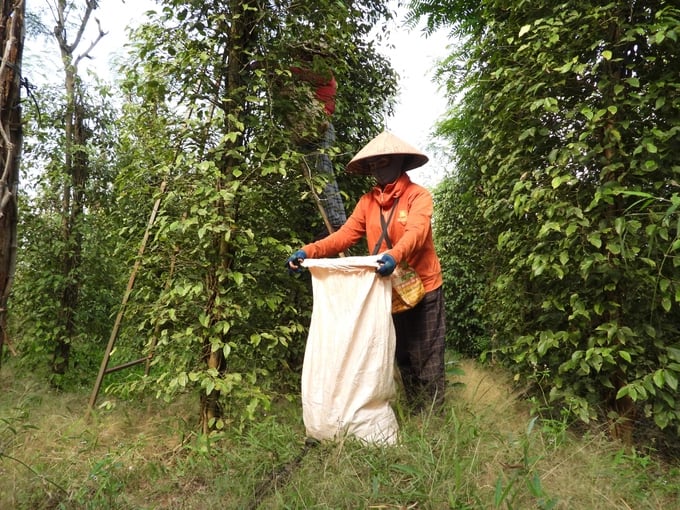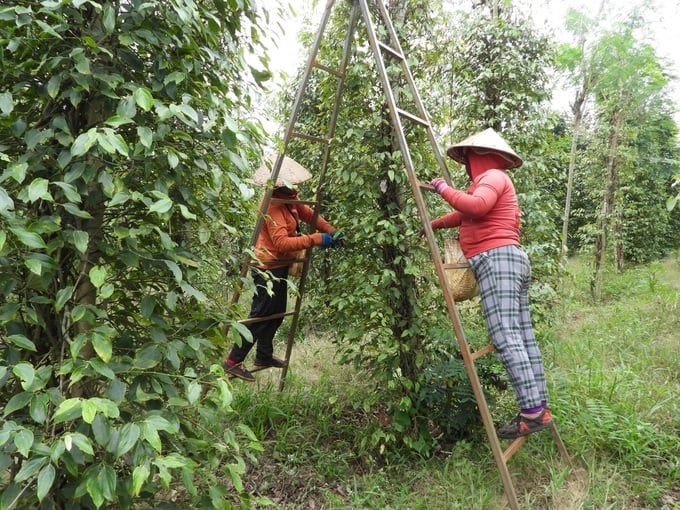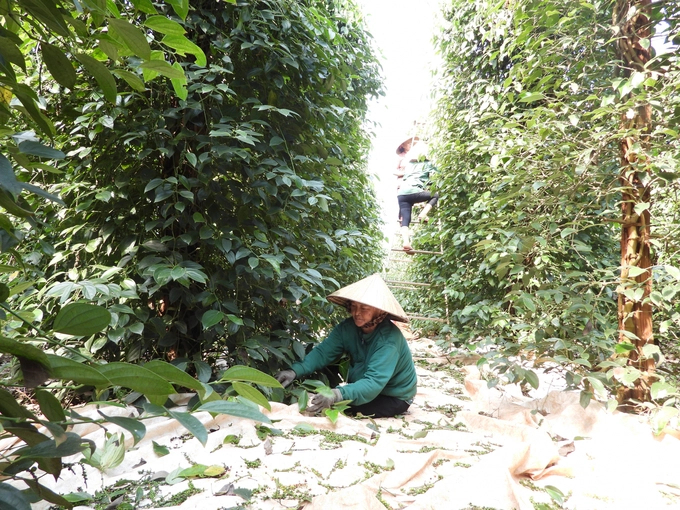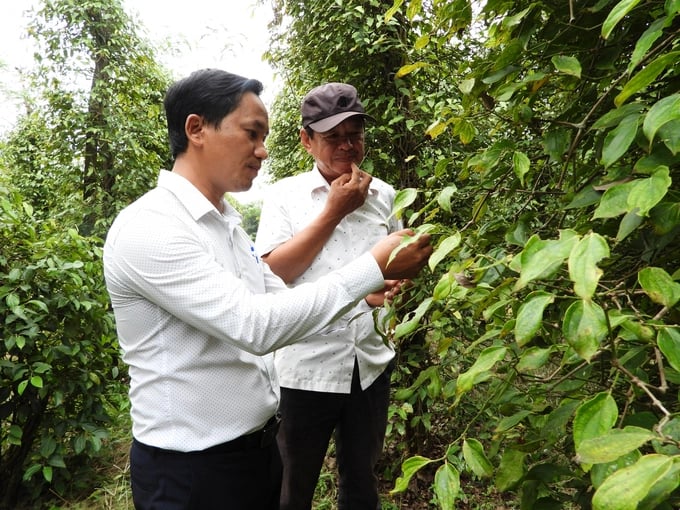November 28, 2025 | 04:48 GMT +7
November 28, 2025 | 04:48 GMT +7
Hotline: 0913.378.918
November 28, 2025 | 04:48 GMT +7
Hotline: 0913.378.918

Many large pepper growing areas of Binh Phuoc province are at risk of being wiped out. Photo: Tran Trung.
Binh Phuoc has many advantages in terms of land, and its climate is favorable for the pepper to grow. Pepper was once likened to "black gold" as it helped many sincere farmers to become billionaires after only one good harvest.
However, in recent years, pepper prices have continuously decreased. The Covid-19 pandemic has made things difficult for growers, and many large pepper-growing areas in Binh Phuoc are at risk of being wiped out. Binh Phuoc's pepper area, which is approximately 15,700 ha at present, is decreasing sharply as pepper is being replaced by more efficient crops.
Being the largest "pepper land" in the province, pepper trees used to provide a significant source of income for families in Bu Dop district. However, in recent years, the productivity of pepper gardens has continuously decreased with pepper trees dying in mass. This results in farmers abandoning their gardens or investing in moderation.

Pepper prices fell sharply while costs of inputs and hiring workers to collect and care for them increased. Photo: Tran trung.
In addition to factors caused by climate change, unseasonal rain, and sunshine affecting pepper productivity, human is also to blame for the current situation. Pepper prices fell sharply while costs of inputs and hiring workers to collect and care for them increased, thus discouraging farmers from further investing in pepper.
Phuoc Thien, Thien Hung, and Tan Thanh commune used to be the focus pepper production point in Bu Dop district, but the once-green pepper gardens are all gone. Instead, now there are cashew orchards or withered pepper gardens with overgrown grass. Some growers choose to intercrop pepper with green skin pomelos. Other households make use of pepper venom to grow Telosma cordata. There are only sporadic green pepper gardens in the development phase. The trees are planted and cared for methodically in a bio-organic direction, aiming to take advantage of the opportunities ahead.

Linking to produce organically and meeting international standards is a trend among pepper-growing households. Photo: Tran Trung.
According to Mr. Tran Van Thanh, Head of the Department of Agriculture and Rural Development of Bu Dop district, the district's orientation in the coming period is not to develop more pepper areas. However, the district also recommends that people keep the existing pepper area.
"If growers want to change crops, they need to choose the type suitable to the soil and climate to make full use of the region's advantages. The district will also continue to propagate and mobilize people to join the organic pepper production chain to gradually improve product value and brand," said Mr. Tran Van Thanh.
Mr. Tran Hung, Head of the Department of Agriculture and Rural Development of Loc Ninh district, added that over the past time, the district had built linkages in the cooperative groups - cooperatives model to reorganize production on key crops including pepper.

The technical staff of Nedspice Company guides farmers in growing organic pepper. Photo: Tran Trung.
For pepper to grow sustainably, agricultural experts advise that growers should focus on quality and output in accordance with the production link chain instead of spontaneous production without proper consideration. To soon find the glory for the staple crop once considered "black gold", the timely intervention of the agricultural industry will act as a compass to help people overcome difficulties.
Establishing linkages to produce organically and meeting international standards is a trend among pepper-growing households recently. Since no chemical fertilizers and drugs are used, the production cost of pepper has been significantly reduced. The resale price is much higher than before.
Through the production process, farmers said that organic farming has contributed to protecting the health of farmers. Farmers no longer have to contact and use chemicals. Also, thanks to the application of organic engineering processes, the ecological environment is restored to a healthier state which is beneficial for human health.

According to Binh Phuoc Department of Agriculture and Rural Development, the provincial Department of Agriculture and Rural Development has coordinated with Nedspice Vietnam Spice Processing Company Limited since 2013 to implement the project "Developing a sustainable pepper supply chain". The program is implemented in 6 districts: Loc Ninh, Bu Dop, Hon Quan, Bu Dang, Phu Rieng, and Bu Gia Map. The quality of pepper products exported to the international market is greatly improved, bringing higher economic efficiency to farmers growing organic pepper.
Translated by Ha Phuc

(VAN) China’s cooking oil is suddenly flooding into India. It all comes down to a soybean surplus that Beijing doesn’t quite know what to do with.

(VAN) An Giang promotes supply-demand connections, standardizes quality and builds value chains, creating a foundation for sustainable bird’s nest development and aiming to expand exports.
/2025/11/24/5339-4-nongnghiep-075331.jpg)
(VAN) Recently, the conference on 'Sustainable Fisheries Linkage Chain - Tilapia for Export' took place in Tien Hai commune, Hung Yen province.
/2025/11/21/4309-2-153400_128.jpg)
(VAN) Green and low-emission rice is paving the way for Vietnamese rice to enter high-end markets, marking the beginning of a transformation journey toward greening and elevating the national rice brand.

(VAN) ‘Right to Win’ outlines a national action plan that shapes a new vision for Viet Nam’s agriculture in an era of renewal and global integration.

(VAN) Lam Dong’s farmed sturgeon output this year is expected to reach 2,300 tons, worth VND 450 billion, affirming the brand’s position on the market.

(VAN) A surge in Ukrainian egg exports, largely driven by soaring sales to the UK over the last few years, has notably pushed up egg prices on the domestic market.